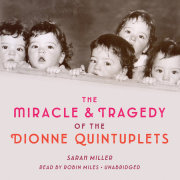November 1943
In an empty nursery, behind two woven wire fences topped with barbed wire, five nine-year-old girls waited for their father. Five suitcases sat alongside them. Five smiling Shirley Temple dolls were clutched in their arms. Yvonne stared out the window at the yellow brick mansion up the hill. Annette quietly seethed, pretending not to be afraid. Cécile sat in a corner, rocking her doll. Émilie prayed that it was all just a bad dream. Marie tried to tell a silly story, but no one laughed.
At the sound of their father’s footsteps in the hall, all five sisters hugged their Shirley Temples closer to their chests. The moment they dreaded had come.
For the first time in their lives, the Dionne Quintuplets were going home.
Oliva Dionne did not speak as he and his five identical daughters walked through the hospital’s guarded gate, down the road, and through another gate that led to the colossal Georgian house that was to be their new home. He did not lead them up the steps to the grand front door. Instead, he entered through a service door into the kitchen. Yvonne followed first, trying to be brave for her sisters’ sake. Though Yvonne was no more than a few minutes older than Annette, Cécile, Émilie, and Marie, she had acted the part of the little mother since she was a toddler. For nine years Mr. Dionne had battled with the government to unite his family under a single roof. Now that his triumphant moment had arrived, the man who had once crawled through a drainpipe to elude hospital guards just so he could glimpse his five famous babies through a window spoke a single sentence.
“The little girls are here,” he told his wife, and continued into the house, leaving his daughters standing in the unfamiliar kitchen with their dolls and suitcases.
“Bonsoir, Mom,” Yvonne, Annette, Cécile, Émilie, and Marie said, greeting their mother in a mixture of French and English.
“Supper will be ready soon,” Mrs. Dionne replied in French, then called for two of her elder daughters. “Show the little girls around the house,” she instructed.
Without a word, “the little girls” followed as their big sisters pointed into one doorway after another. The living room, the den, the sewing room, their father’s office. Redolent of fresh paint and filled with pristine furniture, the house felt new and sterile, more sterile by far than the hospital that had been their home since they were four months old.
Then they reached the dining room. Like everything else in the house, it was big, in this case big enough to seat fourteen—Mr. and Mrs. Dionne, Yvonne, Annette, Cécile, Émilie, Marie, and their seven brothers and sisters, Ernest, Rose-Marie, Thérèse, Daniel, Pauline, Oliva Jr., and Victor. An archway divided the room in half, with a table on each side. “This side is for our family,” the little girls remembered one of their elder sisters saying. “The other side is for your family.”
Not one of the bewildered nine-year-olds knew what to say.
Copyright © 2019 by Sarah Miller. All rights reserved. No part of this excerpt may be reproduced or reprinted without permission in writing from the publisher.










